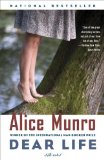Summary | Excerpt | Reading Guide | Reviews | Beyond the Book | Readalikes | Genres & Themes | Author Bio

Stories
by Alice MunroChapter 1
To Reach Japan
Once Peter had brought her suitcase on board the train he seemed eager to get himself out of the way. But not to leave. He explained to her that he was just uneasy that the train should start to move. Out on the platform looking up at their window, he stood waving. Smiling, waving. The smile for Katy was wide open, sunny, without a doubt in the world, as if he believed that she would continue to be a marvel to him, and he to her, forever. The smile for his wife seemed hopeful and trusting, with some sort of determination about it. Something that could not easily be put into words and indeed might never be. If Greta had mentioned such a thing he would have said, Don't be ridiculous. And she would have agreed with him, thinking that it was unnatural for people who saw each other daily, constantly, to have to go through explanations of any kind.
When Peter was a baby, his mother had carried him across some mountains whose name Greta kept forgetting, in order to get out of Soviet Czechoslovakia into Western Europe. There were other people of course. Peter's father had intended to be with them but he had been sent to a sanatorium just before the date for the secret departure. He was to follow them when he could, but he died instead.
"I've read stories like that," Greta said, when Peter first told her about this. She explained how in the stories the baby would start to cry and invariably had to be smothered or strangled so that the noise did not endanger the whole illegal party.
Peter said he had never heard such a story and would not say what his mother would have done in such circumstances.
What she did do was get to British Columbia where she improved her English and got a job teaching what was then called Business Practice to high school students. She brought up Peter on her own and sent him to college, and now he was an engineer. When she came to their apartment, and later to their house, she always sat in the front room, never coming into the kitchen unless Greta invited her. That was her way. She carried not noticing to an extreme. Not noticing, not intruding, not suggesting, though in every single household skill or art she left her daughter-in-law far behind.
Also, she got rid of the apartment where Peter had been brought up and moved into a smaller one with no bedroom, just room for a foldout couch. So Peter can't go home to Mother? Greta teased her, but she seemed startled. Jokes pained her. Maybe it was a problem of language. But English was her usual language now and indeed the only language Peter knew. He had learned Business Practice—though not from his mother—when Greta was learning Paradise Lost. She avoided anything useful like the plague. It seemed he did the opposite.
With the glass between them, and Katy never allowing the waving to slow down, they indulged in looks of comic or indeed insane goodwill. She thought how nice-looking he was, and how he seemed to be so unaware of it. He wore a brush cut, in the style of the time—particularly if you were anything like an engineer—and his light-colored skin was never flushed like hers, never blotchy from the sun, but evenly tanned whatever the season.
His opinions were something like his complexion. When they went to see a movie, he never wanted to talk about it afterwards. He would say that it was good, or pretty good, or okay. He didn't see the point in going further. He watched television, he read a book in somewhat the same way. He had patience with such things. The people who put them together were probably doing the best they could. Greta used to argue, rashly asking whether he would say the same thing about a bridge. The people who did it did their best but their best was not good enough so it fell down.
Instead of arguing, he just laughed.
It was not the same thing, he said.
Excerpted from Dear Life by Alice Munro. Copyright © 2012 by Alice Munro. Excerpted by permission of Knopf, a division of Random House, Inc. All rights reserved. No part of this excerpt may be reproduced or reprinted without permission in writing from the publisher.






Your guide toexceptional books
BookBrowse seeks out and recommends the best in contemporary fiction and nonfiction—books that not only engage and entertain but also deepen our understanding of ourselves and the world around us.